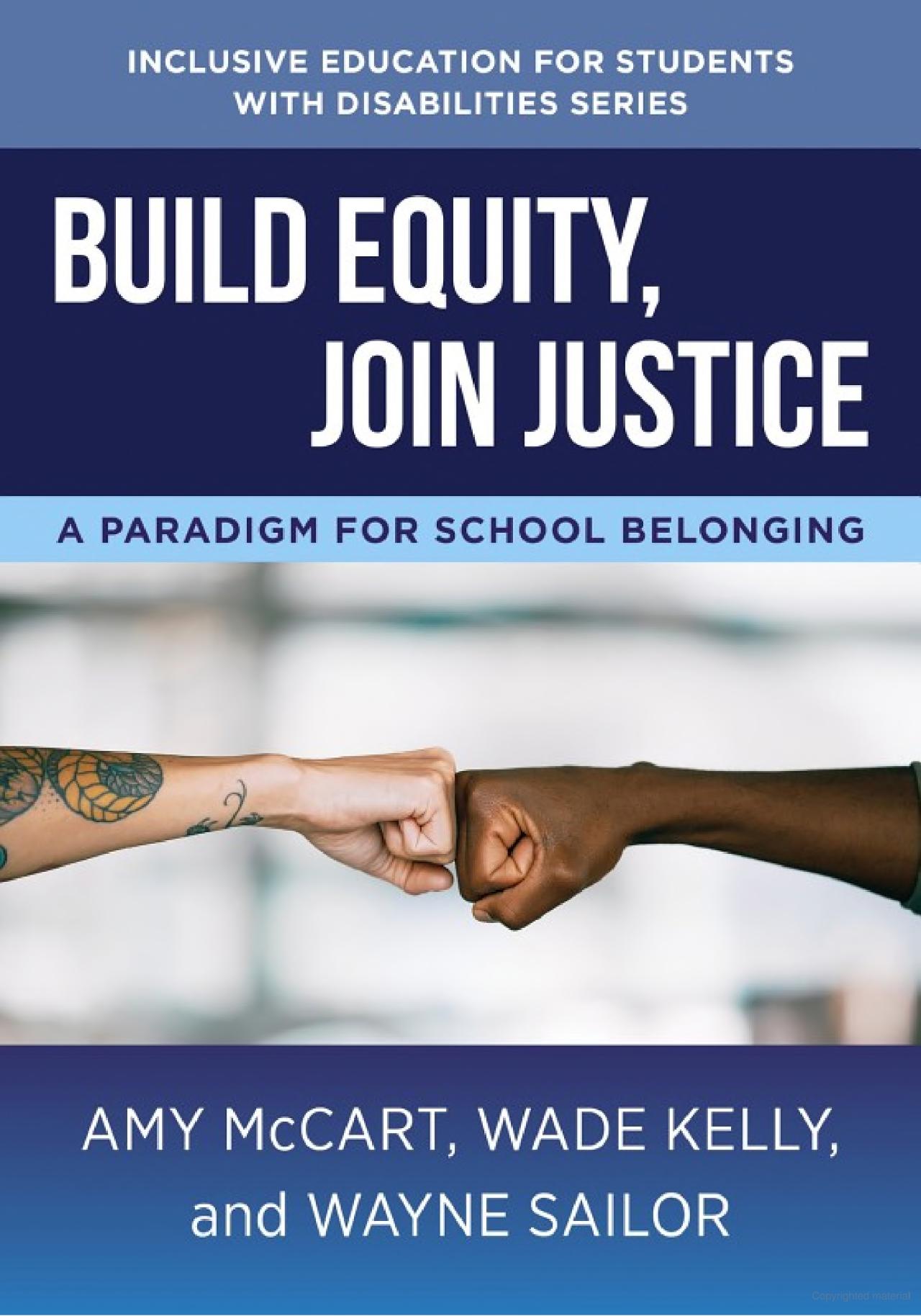KU Experts Author Guide to Transforming Schools Based on Research in Education, Disability
When University of Kansas researchers were invited to write a book for a W. W. Norton & Company series focused on inclusive education for students with disabilities, they worked with the editors of the series to rethink the concept of “inclusion” itself.
 For decades, educational leaders have worked to make education more inclusive, yet these efforts have ultimately not produced sufficiently meaningful change for many students who have historically been excluded from the general education classroom, the researchers asserted. These conclusions led Amy McCart, Wade Kelly, and Wayne Sailor of SWIFT Education Center, a part of the KU Life Span Institute, to frame their contribution to the series as Build Equity. Join Justice: A Paradigm for School Belonging, published recently by Norton.
For decades, educational leaders have worked to make education more inclusive, yet these efforts have ultimately not produced sufficiently meaningful change for many students who have historically been excluded from the general education classroom, the researchers asserted. These conclusions led Amy McCart, Wade Kelly, and Wayne Sailor of SWIFT Education Center, a part of the KU Life Span Institute, to frame their contribution to the series as Build Equity. Join Justice: A Paradigm for School Belonging, published recently by Norton.
Rather than focusing solely on disability, the book explores ways that race, socioeconomic status, and other social hierarchies intersect, resulting in systems that regularly exclude certain students and fail to provide a sense of true belonging. By broadening the focus to include all the systems that place certain students on the margins of their schools, the authors hope to inspire a more ambitious goal for education than simply including students in a dominant culture that was not designed for them. The book offers ten principles, or points, designed to promote equity and justice in education. These points are primarily inspired by the writings, research, and lived experiences of centuries of Black, brown, Indigenous, and queer people of all genders.
“The book hopes to inspire a deeper thinking and a fundamental redesign in the way we as educators understand and support students and the structure of our schools,” said SWIFT Co-Director Amy McCart, noting that it also reflects how SWIFT Education Center has undergone its own transformation.
“At SWIFT, we knew if we wanted to lead schools across the nation in their efforts to support students who have been pushed to the margins, we had to first deepen our own understanding of the role of race and disability in education. At SWIFT, we have committed ourselves to understanding the intersectional nature of student lives and have designed a way for schools to work toward building spaces that create student wholeness,” McCart said.
The Center’s work, which is foundational for the book, supports schools in implementing a practice referred to as “Equity-based Multi-Tiered System of Support (MTSS),” a framework for organizing student support which combines data sources with knowledge of context, science, and systems in education to benefit all students, not just those with disabilities. It is a mechanism through which schools determine how they will support each of their students.
The book outlines strategies for ensuring that implementation of Equity-based MTSS in schools is done with equity as the driving force and the measure of success. This is, in part, a response to the prevalence of educational systems that routinely segregate by placing into separate classrooms or schools those students who learn or behave differently from the dominant culture.
“We as educators must challenge ourselves to personally understand the harm that is occurring to Black and Brown children across our nation and commit to changing our system of education, including special education, to do better. We believe we have created a resource to help guide that work,” McCart said.
In the book, the authors argue that a paradigm shift is needed to address the inequities embedded in many aspects of the educational system. The book’s 10 Point Paradigm presents different facets of equity that need to be considered in order to move toward an ecosystem in education that prioritizes the needs of students who have historically been excluded.
“Although we developed the 10 Point Paradigm in the context of education, and wrote this book with a mind toward those that educate and advocate for students, it is at its essence an invitation to all people to use education as the lens through which we can dream a new vision of life in this country and society as a whole,” said author Wade Kelly, assistant director, content creation, at SWIFT. “The principles nested within the 10 Point Paradigm are meant to recalibrate our moral compass in such a way that it points toward liberation, validation, and solidarity, rather than marginalization and the tired, senselessly punitive strategies and practices of the past.”
The book is intended to provide educators and administrators at all levels several entry points to redesign schools into “equity-advancing, justice-centered institutions,” ones that address the learning needs and well-being of students while joining the larger struggle toward justice for many of those who are marginalized.
Build Equity. Join Justice: A Paradigm for School Belonging written by Amy McCart, Wade Kelly, and Wayne Sailor of SWIFT Education Center, at the KU Life Span Institute, is part of the Norton Series on Inclusive Education for Students with Disabilities is edited by KU Life Span Institute researchers Michael Wehmeyer, chair of the KU Department of Special Education and director of the Beach Center on Disabilities, and Jennifer Kurth, associate professor of special education.